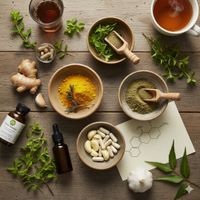SIBO - Antibiotics vs. Natural Supplements

Small Intestinal Bacterial Overgrowth (SIBO) is a condition that, as its name suggests, is characterized by an excessive amount of bacteria in the small intestine. This can lead to a host of uncomfortable digestive symptoms and nutritional deficiencies. This guide explores the basics of SIBO, compares the two primary treatment avenues—conventional antibiotics and herbal therapies—and examines a significant risk factor for developing the condition.
Understanding SIBO & Its Symptoms
Before diving into treatments, it's important to recognise the common symptoms associated with SIBO. Because the overgrown bacteria ferment carbohydrates that should be absorbed, they produce excess gas, leading to:
-
Bloating
-
Excess Gas
-
Abdominal Pain
-
Diarrhea
-
Constipation (often associated with Intestinal Methanogen Overgrowth, or IMO)
-
Nausea
-
Fatigue
Treatment Efficacy: A Head-to-Head Comparison
When it comes to treating SIBO, the goal is to reduce the number of bacteria in the small intestine. The two most common approaches are pharmaceutical antibiotics and antimicrobial herbal supplements.
A notable 2014 clinical study directly compared the effectiveness of the standard antibiotic, Rifaximin, with a course of herbal therapy. The results, based on the normalization of a lactulose breath test, were quite revealing:
Herbal Therapy: Achieved a 46% eradication rate.
Rifaximin (Antibiotic): Achieved a 34% eradication rate.
This suggests that herbal protocols can be at least as effective as, and in this study, were slightly more effective than, the leading prescription treatment.
About Rifaximin (Antibiotic)
Rifaximin is a non-absorbable antibiotic, meaning it acts almost exclusively within the gastrointestinal tract with minimal effects on the rest of the body. It is the most common first-line prescription treatment for SIBO. While it is effective for many, SIBO recurrence can be an issue, and sometimes multiple rounds of treatment are required.
About Herbal Therapy
Herbal therapies for SIBO use plants with potent antimicrobial properties to achieve the same goal as antibiotics. These protocols often combine several different herbs to create a broad-spectrum effect against various types of bacteria and archaea.
Exploring Common Herbal Supplements for SIBO
Herbal protocols often leverage a combination of the following key supplements, each with unique antimicrobial properties.
Berberine
Found in plants like Goldenseal, Oregon Grape, and Barberry, Berberine is a well-researched compound. It's known for its powerful antimicrobial effects against a wide range of bacteria, fungi, and parasites, making it a cornerstone of many herbal SIBO protocols.
Oregano Oil
The active compounds in oregano oil, primarily carvacrol and thymol, possess strong antibacterial and anti-fungal properties. They are effective at disrupting the cell membranes of pathogenic microorganisms.
Neem Extract
Used for centuries in Ayurvedic medicine, Neem (from the Azadirachta indica tree) has antibacterial properties that help reduce the bacterial load in the gut. It is also believed to have valuable anti-inflammatory benefits.
Allicin (Garlic Extract)
Allicin is the powerful antimicrobial compound found in garlic. It is particularly noted for its effectiveness against methane-producing archaea, which are associated with constipation-dominant SIBO (IMO).
A Key Risk Factor: Proton Pump Inhibitors (PPIs)
While SIBO has many potential root causes (such as poor gut motility or structural issues), one of the most significant and well-documented risk factors is the long-term use of Proton Pump Inhibitors (PPIs). These are medications used to reduce stomach acid for conditions like acid reflux or GERD.
Here's how they can contribute to SIBO:
-
Normal Stomach Function: A healthy stomach has a very high level of acid. This acid acts as a crucial sterilizing barrier, killing most ingested bacteria before they can pass into the intestines.
-
Effect of Long-Term PPI Use: PPIs work by significantly suppressing stomach acid production. Over time, this weakens the stomach's natural defence mechanism.
-
Bacterial Overgrowth: With a less acidic environment, more bacteria from food and the upper GI tract can survive the journey through the stomach. These surviving bacteria can then take up residence and proliferate in the small intestine, leading to SIBO.
Disclaimer: This information is for educational purposes only and is not intended as medical advice. Always consult with a qualified healthcare professional before making any decisions about your health or treatment.